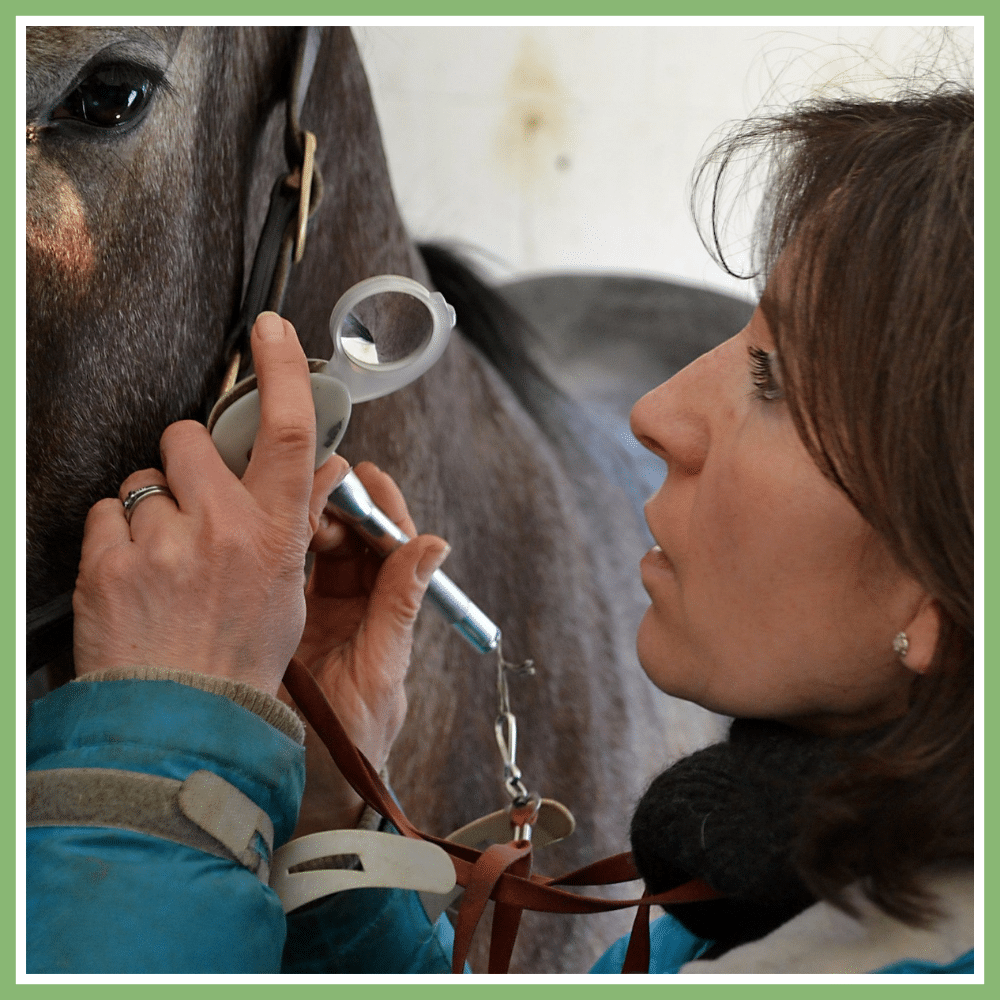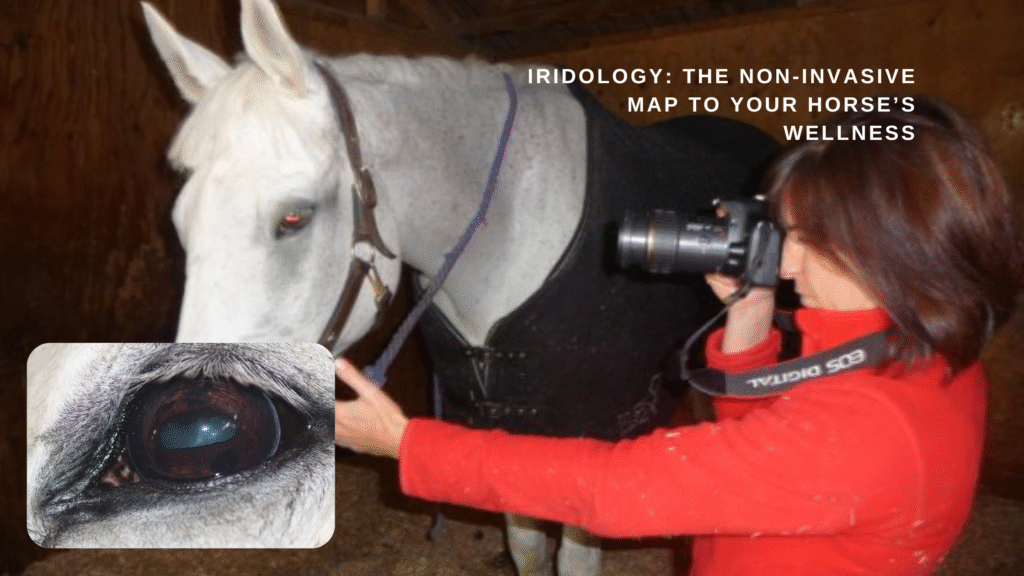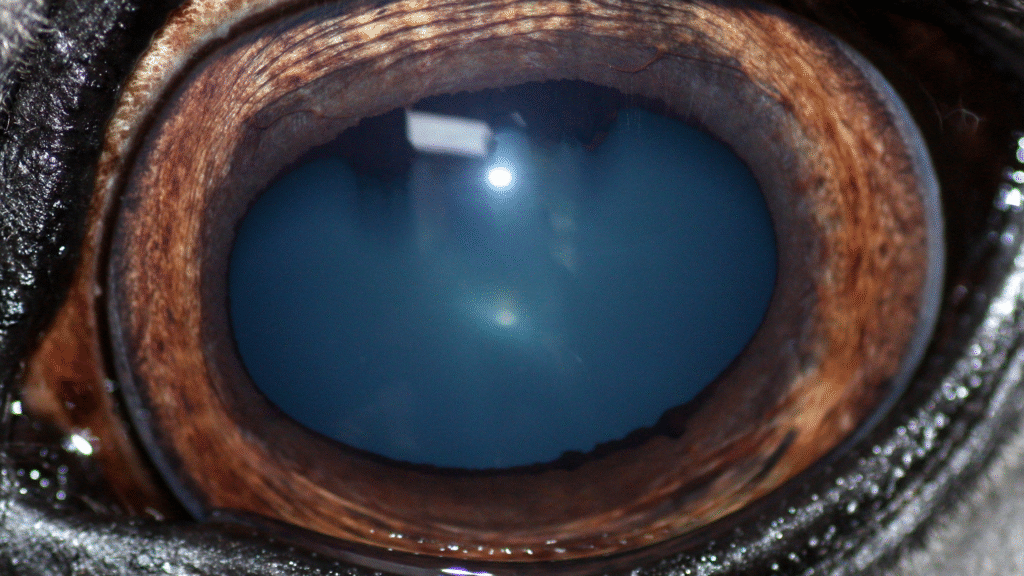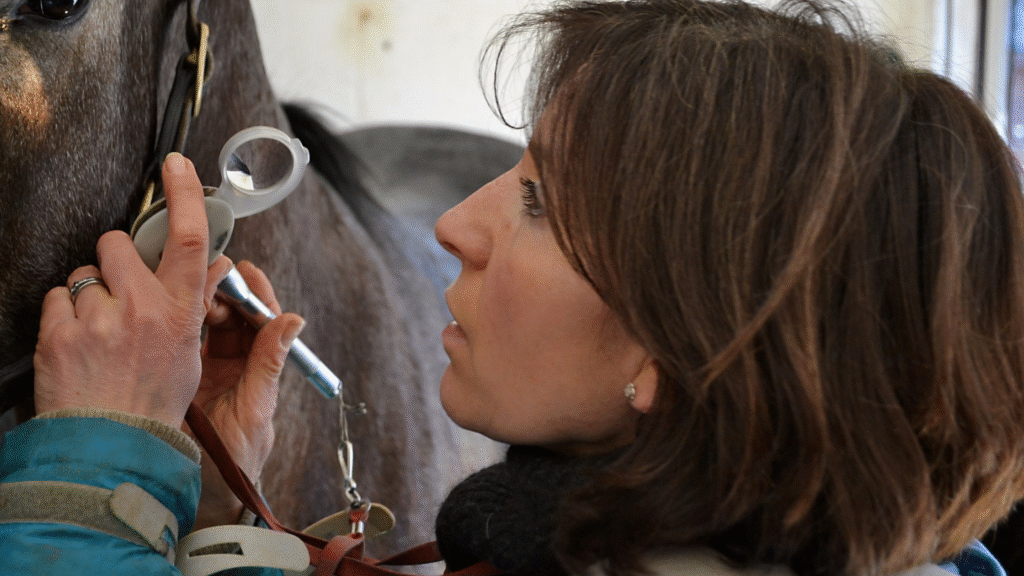Equine Iridology: What Your Horse’s Eyes Reveal About Health, History & Healing… The Eyes Really Are the Windows To The Soul
Have you ever looked into your horse’s eyes and felt they were telling you something? As a Holistic Biologist and Equine Iridologist (qualified in 2008), I’ve learned to trust what the iris shares, not to diagnose disease, but to map patterns: inherited tendencies, stress loads, energetic blocks, the root cause of ongoing physical or behavioural issues, and areas asking for support before they shout as symptoms.
This is a love letter to horses, to real observation, and to getting back to nature without abandoning science. If you’ve been looking for a non-invasive way to understand the why behind behaviour, tension, or recurrent issues – welcome. 🌿
What Is Equine Iridology (Really)?
Iridology is the art and science of reading the iris – the coloured part of the eye – as a reflex map of the body’s constitutional strengths and stress points.
It does not name diseases. Instead, it helps us see:
- (Without a scan) into every internal system of your horse, including the digestive system, all the organs, structural system, immune and lymphatic health, and metabolic health.
- Where tissue/organs may be over- or under-active (inflammation vs. sluggishness).
- Patterns of lymphatic congestion, acidity, or toxicity.
- Structural strain and spinal/neuromuscular stress signatures.
- Digestive and elimination stress markers.
- Nervous system tone and dysregulation.
- Inherited strengths/weaknesses that shape resilience, and therefore what individual support your horse may need.
- Potential root causes of issues.
- How to clarify nutritional and musculoskeletal support, working alongside veterinary treatment, and enhance results with self-selection and red light/healing modalities.
Iridology provides an essential insight, blending science and ancient holistic wisdom, into the individual requirements of each horse, giving a picture of what in their inherited traits, past, present and future is needed to provide the best support, bring them back into balance, and keep them there.
So many people struggle to know if their food/forage/environment is supporting their horse or causing them stress (physical and emotional). A consult provides a roadmap for support: feed, supplements, detox strategies, bodywork, red light therapy, herbs/oils (including self-selection), and management tweaks that fit your horse.
Iridology truly expresses the body as energy; it stores information from the past and the present, and also shows developing issues before they appear as symptoms.
For the Scientists (and the Skeptics)
The iris originates from the same embryologic tissue as the brain and nerves. Through the autonomic nervous system (the body’s control wiring), shifts in organs and tissues are mirrored as subtle changes in iris fibres, colour and shading, a living map of adaptation.
Biology is amazing: 300,000 nerves from various parts of the body make their way to the optic nerve. Cells communicate all the time, and changes in this communication show up in an iridology reading. When a cell is healthy/damaged/diseased, its frequency transmitted via nerve endings changes; this change is transmitted via the optic nerve and can show as markings in the iris, providing a wealth of information. Different health/disease states have different energetic signatures.
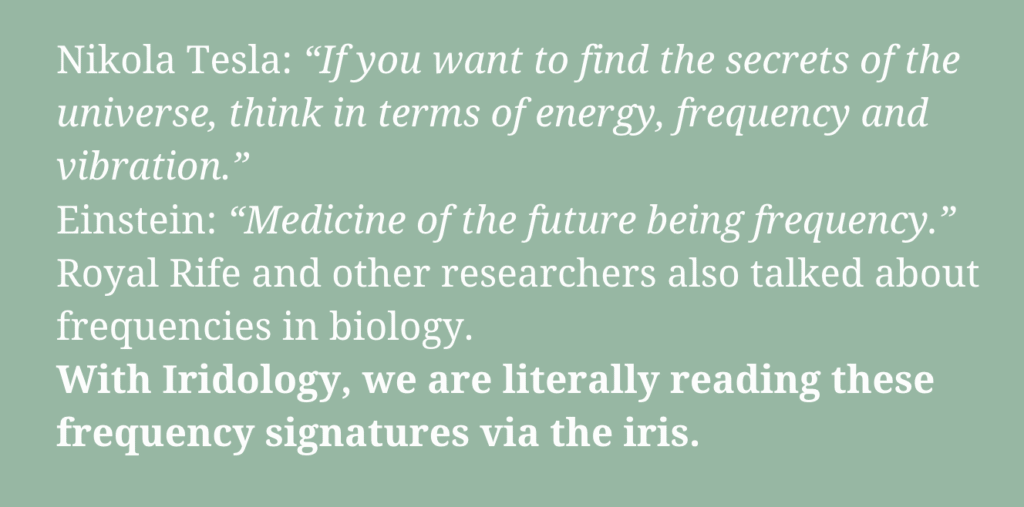
The markings, textures and colourations indicate which organs, structural areas and body systems are under stress/inflamed/not performing optimally. Iridology can assess where current challenges may be present and whether there are inherited weaknesses and/or inherent strengths. This information forms an action plan to guide support, nutritional/diet choices and management/lifestyle decisions for your horse, pony or donkey.
Holistic Equine Iridology is non-invasive and involves shining a light into the corner of each eye to observe markings and (usually) taking photographs of your horse’s eye (this is not stressful), which can be better analysed on a computer.
- The iris is richly innervated and functionally tied to the central and autonomic nervous systems.
- The Inner Pupillary Border (IPB) – that thin ring around the pupil – reflects autonomic tone. Uneven or jagged IPB often correlates with chronic stress, trauma imprints, or dysregulation.
- Iridology is observational physiology: it correlates iris signs with body systems to inform management decisions. It’s not a replacement for veterinary diagnostics; it’s a non-invasive lens to prioritise care.
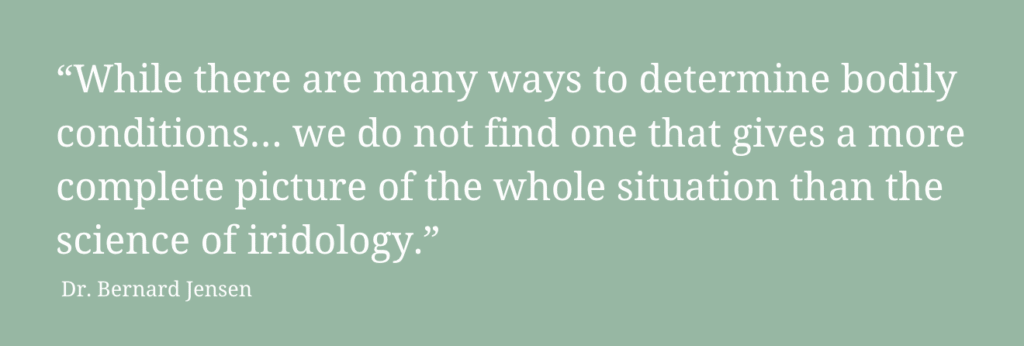
I’m committed to an evidence-informed approach: clean observation, repeatable photography, careful history, and changes you can measure, better comfort, calmer behaviour, improved recovery, stronger hooves/coat, healthier stools/urine, improved ridden work. An all-round happier, healthier horse.
Why Horses Respond So Clearly
Unlike humans, horses don’t rationalise away their state. Their bodies tell the truth. In practice, equine iridology often reveals:
- Lymph & connective tissue tendencies (oedema, stocking up, slow healing).
- Adrenal stress (over-reactivity or flatness; “spooky then shut-down”).
- Digestive signatures (feed intolerances, hindgut burden, ulcers, dysbiosis).
- Respiratory load (dust, mould, environment).
- Hoof and musculoskeletal strain (compensation patterns).
- Emotional holding from past handling, pain, or management.
- Organ stress: long before this shows in blood tests (for example, who knew an inflamed liver can cause right-hind issues?).
These findings guide, they don’t label. We marry what the eye shows with what your horse needs today. It’s an amazing relief to take the guesswork out of what is going on with your horse.
What an Iridology Assessment Can and Cannot Do
Likely Insights
- Constitutional strengths/weaknesses of organs, glands, tissues: why one horse is prone to something whilst another is not.
- Inflammation vs hypoactivity patterns: seeing this early before real damage is done.
- Lymphatic congestion, acidity, circulation concerns.
- Digestive and elimination stress.
- Structural stress (often remarkably accurate).
- Trauma/nerve stress and overall nervous system tone.
- Past and present imbalances in internal organs/body tissues.
- Injuries, if they have left scar tissue.
- Inherited behavioural and physical traits.
- Developing issues: often visible long before symptoms appear (sooner detection = easier, cheaper, more successful rebalancing).
- Where to start with self-selection and what herbal support may be appropriate for ongoing care.
- Management decisions tailored to your horse.
- Discipline suitability (e.g., a horse with kidney weaknesses may be unsuited to endurance).
- Investigate root causes behind sudden behavioural changes (e.g., napping, bucking).
In my experience, iridology has been crucial to keeping my ponies healthy. Many clients have managed long-term issues, often reversing them. Elderly horses can be supported to prolong quality of life; competition horses can be kept in optimal performance and as physically and stress-free as possible.
While a horse recovering from prolonged or serious illness or accident may not return to a perfect 100%, once the body receives exactly what it needs, the capacity to heal can be remarkable.
IRIDOLOGY IS NOT INTENDED TO SUBSTITUTE MEDICAL OR VETERINARY ADVICE OR TREATMENT.
What Iridology Cannot Do
- Name diseases (e.g., Cushing’s/PPID, laminitis, cancer)…only a vet can legally diagnose an animal. Iridology may reveal an issue in a particular area (e.g., liver) but won’t specify the exact problem.
- Name infections (bacterial/viral/fungal).
- Determine blood values (glucose, hormones, liver enzymes).
- Show stones, tumours, pregnancy, life expectancy.
- Conditions masked by recent anaesthesia (temporarily disrupts reflexes).
- Identify the cause of an injury.
- Tell if an animal is pregnant.
- Tell the life expectancy of an animal.
Translation: Iridology helps us choose the next right actions & ongoing support: feed, mineralisation, detox, turnout, hoof and saddle strategy, bodywork, stress reduction, not to replace your vet or other therapists, but to work alongside them. We are in a time when true collaboration is needed; we all hold different pieces of the health jigsaw. When we work together, every animal benefits.
The Inner Pupillary Border: The Nervous System’s “Whisper”
If you remember one thing, make it this: the IPB is a fast read on your horse’s autonomic state.
- Smooth, even tone → better rest–digest–repair.
- Jagged, broken, thick or thin → sympathetic dominance, stored stress, or strain on digestion/immune/detox.
This is why iridology pairs beautifully with nervous-system-friendly care: forage-first feeding, appropriate minerals/electrolytes, turnout, herd connection, red light therapy, gentle bodywork, and breath/grounding routines for the human (yes – you regulate, your horse follows).
Session Flow: What to Expect
Non-invasive. Calm. Thorough.
- Pre-consult form: completed before the visit so we can focus on your horse.
- Imaging: light, magnification, and high-resolution photography of each iris. No sedation, no stress. Indoors or shaded is best (prevents glare).
- Structural pain assessment: yard consults include testing key acu-points/trigger points to detect pain. If present, a red light session can be undertaken, especially important for hyoid balance.
- Review & plan:
- Iris review (constitutional type; zones; key markings).
- Priority map (what to do first vs later).
- Plan: practical and doable:
• Feed & forage tweaks
• Mineral/supplement balance
• Lymph & gut support (self-selection options or safe add-ins)
• Detox hygiene (water/air, mould, paddock reality, EMFs)
• Musculoskeletal strategy (hoof care, saddle, groundwork)
• Red light therapy/bodywork when helpful (I’m qualified and can provide)
• Self-selection guidance (what to offer first)
You leave with clarity and a clear plan, what matters now, what can wait, and how to measure progress.
Note: The full written report with recommendations follows within a week (allows time to enlarge photographs and check fine detail).
Distant/ Online Equine Iridology Consult Options
Great results are possible from a distance with clear photos.
Before booking/payment: please email photos first to catherineedwardsNLN@gmail.com so I can confirm they’re suitable. I’m happy to arrange a quick call to guide you; I’ll also provide a short video of needed.
How to take the photos (checklist):
- Setting: natural shade or indoors (avoid direct sun/harsh reflections).
- Framing: the iris fills the frame; I don’t need the whole head.
- Focus: tap to focus on the iris; use AE/AF Lock (tap-and-hold) on iPhone/Android.
- No digital zoom: use 1× lens (or true optical 2×/3× if your phone has it). Do not pinch-zoom—it destroys fine detail.
- Multiple takes: send 3–5 shots per eye; horse relaxed; helper holds softly.
- Files: send full-resolution originals (JPEG/JPG or HEIC). Do not crop/edit or use screenshots.
- Transfer: email or cloud link (avoid WhatsApp/Messenger—they compress images).
- Flash: only if needed; acclimatise your horse first to avoid spooking.
The same consultation form will be completed, and I may ask for additional horse photos depending on findings.
Examples of Photo Quality That is Needed For An Online Consult:

Why This Matters Now
Most “normal” stables (however well run) are a mix of rich grass, processed feed, rugs, restricted movement, dust, chemicals, and stress, not nature. Many horses cope…until they don’t.
Iridology brings the big picture back into view, the part conventional pathways can miss, so we can act early, kindly, effectively. It’s a win for your horse, their caregiver, and the yard.
“The definition of insanity is doing the same thing and expecting different results.”
If your horse keeps circling the same problems, change the map.
Work With Me / Learn With Me
Consults (UK in-person • Global distance/Zoom)
- In-person Equine Iridology (UK): email catherineedwardsnln@gmail.com for availability & pricing.
Details: https://www.catherineedwards.life/holistic-consults/
Guide pricing:
• Home Visit Equine Iridology Consultation/Structural Assessment + Full Report + Red Light Therapy: £150 + travel
• Discounts for 2+ horses at the same yard
• Follow-ups: from £75 – exact price dependant on requirements - Distance Consults (worldwide) with full report: £97
Please send high-resolution photos of each eye before booking so I can confirm quality.
Book: https://www.catherineedwards.life/holistic-consults/reset-recharge-for-animals/ - Integrated Sessions Available: Iridology + Red Light/bodywork + Animal Communication (as appropriate) – contact me to discuss your requirements.
Train as an Equine Iridologist (Accredited Diploma)
Ready to add a powerful, heart-led tool to your practice? I run an approved Holistic Equine Iridology Diploma, open globally.
- Discovery call (free): https://www.catherineedwards.life/consults/free-discovery-call-15-mins/
- Course details & syllabus: https://catherineedwardsacademy.com/p/the-iridology-diploma
- Payment plan available – see https://catherineedwardsacademy.teachable.com/p/holistic-equine-iridology-diploma-online-course-payment-plan
Our Team
I collaborate with trusted, qualified iridologists in the UK and Tasmania for local support. If I can’t fit you in, I can often recommend one of my trained Iridologists or another trained Practitioner.
A Note on Claims
I honour both the horse and the science. Iridology does not diagnose. It informs a holistic plan that respects your vet’s role and your horse’s individuality. The horses show us – clearly – when we’re on the right track: long-term issues resolved, softer eyes, freer movement, steadier digestion, calmer work, bright coats, better hooves, deeper connection. IRIDOLOGY IS NOT INTENDED TO SUBSTITUTE MEDICAL OR VETERINARY ADVICE OR TREATMENT.
Book & Contact
If you’re ready to listen to what your horse’s eyes have been trying to say, I’d love to help.
- Email: catherineedwardsnln@gmail.com
- Book a Distance Consult: BOOK HERE
- Diploma Enquiries: BOOK HERE OR To See the Diploma and Register see here: TO PAY IN FULL CLICK HERE OR TO PAY IN INSTALMENTS CLICK HERE I recommend we have a call first before booking to check this Diploma is a good for for you
Stay curious. Stay connected.
Catherine x

